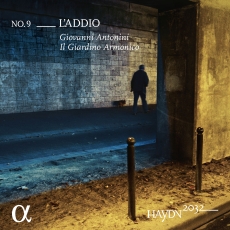Giovanni Antonini & Il Giardino Armonico - Haydn 2032, Vol. 9: L'Addio - WRTI
The album’s namesake “L’Addio,” the Symphony No. 45, or “Farewell,” is one of history’s greatest examples of musical diplomacy. According to legend, Haydn’s employer, Prince Nikolaus Esterhazy, was dragging his feet during the late summer of 1772, not giving the go-ahead for his court musicians to disband for a well-deserved vacation. The musicians, all under Kapellmeister Haydn’s supervision, complained to Haydn about missing their wives and families.
But did Haydn himself complain to the Prince? He finessed the situation with a more intelligent strategy; he wrote his Symphony No. 45.
Haydn penned the first movement in the disquieting key of F-sharp minor, evoking the discontent of his colleagues’ emotional state. Not to browbeat the Prince, the second and third movements are sunnier, almost good-natured. And then — the famous Farewell occurs in the final movement.
One-by-one, each group of musicians play their final phrases, take their candles (used at that time to illuminate their music stands) and exit the stage. Finally, only the concertmaster and Haydn himself play their last, expiring phrases to evoke the wished-for “Farewell.”
The next day, the Prince announced vakay for everyone.
Il Giardino Armonico, under the direction of their founder and music director Giovanni Antonini, gives a clear, nuanced and beautifully balanced account of Haydn’s Farewell Symphony. The lesser-known Symphony No. 15 in D Major and the Symphony No. 35 in B-flat Major receive fresh and detailed performances as well.
Especially delightful to this listener— the witty accelerando in the Trio section of Symphony No. 35's third movement, and the deft handling of harmonic surprises that foreshadow Mozart’s great symphonies.
Besides the admirable performances of three symphonies, our Classical Album of the Week also features soprano Sandrine Piau in the concert aria Scena di Berenice. Haydn composed this dramatic work some 20-plus years after the “Farewell” Symphony, for the last concert of his celebrated second stay in London.
With a text taken from the final act of Pietro Metastasio’s Antigono, the scene depicts the character Berenice, tormented by the prospect that her lover, Demetrio, has resolved to kill himself. Piau brings out all the pathos and the drama of Haydn’s finely-written operatic scene with beautiful nuances of tone and emotional fire.
With this scene, Il Giardino Armonica and Sandrine Piau reveal a theatrical and extremely passionate side to Papa Haydn, one we don’t associate with Haydn the humorist and diplomat. It’s fascinating to hear. The remainder of Il Giardino Armonico’s “Project 2032” series will undoubtedly reveal even more facets of this great composer’s creativity as we approach 2032.



